

Geoff’s Narrations
The GIST
The Blog
Bronc Brings a UK perspective to U.S. ME/CFS matters as he talks with Avindra Nath and Vickie Whittemore as he digs into the big intramural study and the road ahead for the National Institutes of Health (NIH)
The GIST
- With the ME community in the UK struggling, nearly 3 years later, to get local and regional ICB’s (Integrative Care Boards, which commission health services) to implement the new guidelines from NICE issued in October 2021, Bronc turns his attention to the U.S. with an interview with two ME/CFS experts from the National Institutes of Health (NIH): Dr. Avindra Nath and Vickie Whittemore.
- While the Nath intramural study has produced some controversy Bronc cites two UK ME/CFS researchers who called it “an important paper” and “a prime example of the research required to deepen our limited understanding of this complex disease and ultimately identify treatments.”
- Nath said his long-standing interest in studying inflammatory and infectious diseases of the brain, particularly how viruses establish a chronic infection in the brain and/or cause a neuroinflammatory process led him to take on the intramural study.
- He asserted that the study “convincingly demonstrated the biological basis of the disease that cannot be explained by deconditioning and psychological factors” and identified several novel targets for modifying the course of the disease.”
- Nath proposed that the inability of naïve B-cells to mature and produce effective fighting (i.e. antibody-producing cells when presented with an infection) is driving ME/CFS. That idea fits past studies which found that problems producing energy have stopped the B-cells in ME/CFS patients from maturing. It also fits with the possibility that ME/CFS is an autoimmune disease, as problems with B-cell maturation have been associated with an increase in autoantibodies.
- Interestingly, the main target of the virus most linked with ME/CFS – the Epstein-Barr Virus – is B-cells.
- Other major findings include dramatic sex immune and metabolite differences between men and women, proteins in the cerebral spinal fluid that could serve as a biomarker, and downregulation of a part of the brain called the temporal-parietal junction, which is involved in initiating physical action.
- The effort preference finding and the Effort-Expenditure for Rewards Task (EEfRT) have generated controversy. THE EEfRT task has been mostly used in psychological diseases but has been used in Parkinson’s Disease as well – a disease which, like ME/CFS, features basal ganglia dysfunction linked with reduced “reward”.
- Nath noted that the study suggested immune modulatory therapies could be helpful and proposed that “platform” clinical trials be used to more cheaply assess possible treatments. (The NIH’s RECOVER Initiative recently embraced platform studies and Nath has begun an IVIG trial in long COVID.
- The Roadmap Initiative was an in-house effort to spark NIH efforts on ME/CFS by highlighting research opportunities. While some small initiatives came out of it (clinical trial working group, a genetics working group, and new NIH funding mechanisms to support exploratory research) no new funding designed specifically for ME/CFS has emerged.
- Instead, the NIH dropped one ME/CFS research center – leaving its hallmark ME/CFS research centers program at 50% of its original funding (adjusted for inflation). A new ME/CFS funding opportunity is expected, however, sometime around the end of the year.
- Maureen Hanson’s NIH-funded ME/CFS research center will do a deep dive into the muscles, the immune system, and platelets. Ian Lipkin’s center will focus on genetics, finding evidence of past infections, and assessing antibody levels.
- The NINDS Institute is also creating what appears to be the first NIH funding opportunities for post-infectious diseases (including ME/CFS, FM, POTS, Lyme, etc.). Funding levels, however, are unknown.
Here in the UK, the ME community is struggling, nearly 3 years later, to get local and regional ICB’s (Integrative Care Boards, which commission health services) to implement the new guidelines from NICE issued in October 2021. It is quite clear that the medical establishment in the UK still does not take the education of health professionals about ME seriously. I speak to medical students at my local university regularly and none have had any training about ME – never mind the fact that many have not even heard of our illness.

Bronc reports that the UK has not delivered on its promise to implement the NICE guidelines
The coroner’s inquest into the tragic death of Maeve Boothby O’Neill from ME, at the young age of 27, has further revealed the many failings of the NHS when it comes to the treatment and care of people with severe ME. Insufficiently educated health professionals regarding the understanding and treatment of ME stood out like a sore thumb.
To compound matters, here in the UK there is a derisory amount of money being invested into biomedical research into ME. Both the medical establishment and politicians from the Labour government display no sense of urgency about improving the lives of people with our illness.
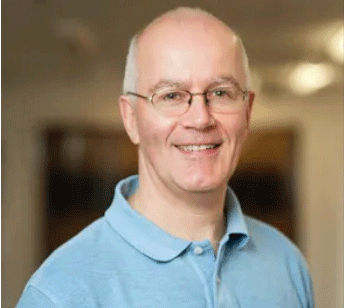
While the study has sparked controversy Karl Morten said he was excited about the “next steps”.
As the U.S. NIH/NINDS ME research roadmap of May 2024 notes, “Time is life, especially where life-diminishing diseases are concerned.” This lack of urgency fits perfectly with the damning report issued by the UN Committee on Disabilities in April of this year. This UN report noted that disabled people in the UK face “systematic violations” of their human rights.
There is some comfort to be had from the research and plans for further research from NIH/NINDS in the United States. A new study from the NIH in the United States, which lasted eight years, and had more than 70 authors from 15 countries, was published in Nature Communications in February of this year. This study, “Deep phenotyping of post-infectious myalgic encephalomyelitis/chronic fatigue syndrome”, clearly states that ME is a biological illness whose primary characteristics are immune dysfunction and brain abnormalities.
While the study has sparked some controversy, it has also been welcomed by several scientists in the field of ME research and beyond. Prof Karl Morten, Principle Investigator, Nuffield Department of Women’s & Reproductive Health (NDWRH), John Radcliffe Hospital, University of Oxford, said:
“This is such an important paper and one I am so pleased to see come out. With our meagre research budgets we can only dream of running a study like this.”
“The brain appears to be potentially driving the patient’s response. The big question is why? Is something still going on we are not yet aware of? The immune system is dysregulated and appears to still be showing an antigen response. Is this suggesting a foreign entity is still present or has the system gone rogue? The differences in many of the symptoms appear linked to male/female differences. This is important as we have perhaps got bogged down trying to understand the vast number of different and changing symptoms for too long.”
“Can we now start to hone in on what is really important? I am very excited about next steps and the major funders now need to step up and provide sustainable global funding for ME/CFS research.”
Dr Katharine Seton, Research Scientist, Quadram Institute Bioscience, said:
“This comprehensive study on a well-defined subgroup of ME/CFS patients serves as a prime example of the research required to deepen our limited understanding of this complex disease and ultimately identify treatments. Historically, studies investigating ME/CFS have often focussed on singular aspects of the disease, largely due to inadequate funding for this disease. These fragmented studies merely offer isolated pieces of a larger jigsaw puzzle. However, the current paper stands out with its extensive author list, featuring experts from diverse disciplines collaborating to assemble these pieces and reveal a more complete picture. This interdisciplinary approach is crucial for advancing our understanding of this disease.”
This study, as important as it is, was not perfect and had a number of important weaknesses. It did not include people with severe ME, it only had 17 participants, did not include people with ME without an infection prior to onset, and included a somewhat dubious term to explain why people with ME respond differently to healthy people in physical exercise challenges.
The Avindra Nath Interview
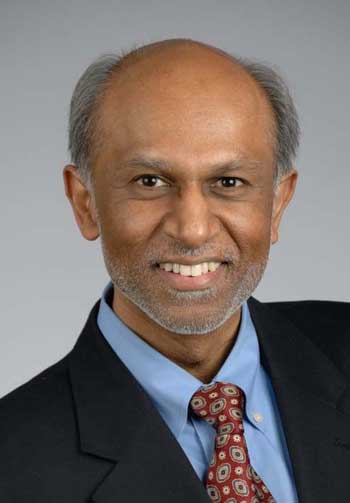
Avindra Nath, the leader of the study, believes the disease may begin in dysfunctional B-cells
Dr. Avindra Nath, Clinical Director and Senior Investigator at NINDS and one of the co-authors of the above study, took time out from his busy schedule to talk about the findings of this 8-year study. Meanwhile, his colleague Dr Vicky Whittmore, Programme Director at NINDS, also gave some input regarding the ME research roadmap agreed by NIH/NINDS in May of this year.
Responses to questions 1-4 by Avindra Nath, M.D, Clinical Director and Senior Investigator at NINDS. Responses to questions 5-6 by Dr. Vicky Whittemore, Programme Director at NINDS.
How did you get involved in the field of ME research?
Avindra Nath: I have had a long-standing interest in studying inflammatory and infectious diseases of the brain, particularly how viruses establish a chronic infection in the brain and/or cause a neuroinflammatory process.
In 2015, Dr. Francis Collins, the NIH Director at that time, approached me to see if I would be interested in taking a fresh look at ME/CFS and develop a clinical protocol to study it. With the help of Dr. Brian Walitt, a rheumatologist, we put together a team of 75 experts across NIH to take a deep dive into the clinical characteristics and pathophysiology of the illness.
Due to my expertise in infections, we recruited a specific cohort of patients whose ME/CFS was clearly triggered by an infection and made sure that there was no other underlying illness that could explain their symptoms.
These patients were admitted to the NIH Clinical Center for a period of one to two weeks and underwent a very large battery of tests. This is the most extensive study done to date on ME/CFS and has transformed our understanding of the disease.
Sadly, here in the UK and in many other countries there are many doctors who still believe that ME/CFS is a somatic psychological illness. This has held back treatments for people with ME who have suffered decades of health inequalities. Yet earlier this year, you and a group of colleagues from NIH in the United States, published a new detailed study, Deep phenotyping of post-infectious myalgic encephalomyelitis/chronic fatigue syndrome, which looks inside the bodies of people with ME.
From looking at your findings, it appears that you clearly noted that ME is a physical disease whose key characteristics are immune dysfunction and brain abnormalities. Is that a fair assessment of your findings? If so, please can you briefly explain these findings for the layperson?
Avindra Nath: Yes, that is correct. We hope that one of the major takeaways from our study is that we have convincingly demonstrated the biological basis of the disease that cannot be explained by deconditioning and psychological factors.
We have further identified several novel targets for modifying the course of the disease. We hope these findings will change the minds of many. All the same, I am certain that once we have a biological therapy for ME/CFS, it will provide definitive evidence for the biological basis of the disease.
We found that post-infectious ME/CFS is a multisystemic disease, with involvement of the immune system, autonomic nervous system, the brain, and the gut. We believe that the primary defect is in the maturation of B cells which
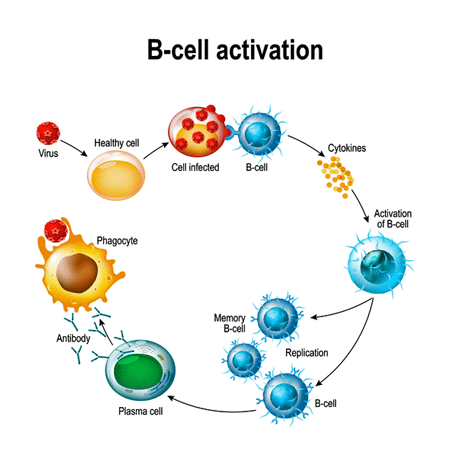
Nath believes and other studies have found that B-cell activation process gets stuck early on…
leads to immune exhaustion and activation of innate immune responses.
Note – Nath proposes that the inability of naïve B-cells to mature and produce effective fighting (i.e. antibody-producing cells when presented with an infection) is driving ME/CFS.
This jives with several ME/CFS findings: first, that the illness is often triggered by an infection. Second, it fits with two UK studies by a B-cell specialist named Geraldine Cambridge which suggest that problems producing energy have stopped the B-cells in ME/CFS patients from maturing. Interestingly, similar energy production problems appear to be occurring in the T-cells as well.
Nath’s idea also fits, oddly enough, with the possibility that ME/CFS is an autoimmune disease, as problems with B-cell maturation have been associated with an increase in autoantibodies. (B-cells are major drivers of many autoimmune diseases.)
Problems with B-cell maturation can also produce “inflammaging” where the immune system seems to be prematurely aging -something that may be happening in ME/CFS in T-cells as well. Note that the biggest agent of viral reactivation in ME/CFS – the Epstein-Barr virus – primarily infects B-cells.
Nath’s idea appears to be the immune system attempting to compensate for the B-cell exhaustion by ramping up the activity of the innate immune system which is: a) designed to produce a kind of holding action to give the B and T-cells time to mature; but b) is not effective at ridding the body of pathogens; and c) produces a lot of inflammation to boot.
The gist is that with the B-cells knocked down (and possibly the T-cells since they appear to be exhausted as well), the innate immune goes bonkers producing inflammation all the while inadequately controlling the pathogen. A 2021 study suggested the B-cells in ME/CFS are indeed reacting to a pathogen.
On the T-cell front, three studies this year have found T-cell exhaustion in ME/CFS and one hypothesis proposed T-cell exhaustion the main driving the disease.
There were also distinct sex differences; women had markers of overactive B cells and men had greater T cell activation. This suggests that potential immune therapies would need to be tailored accordingly.
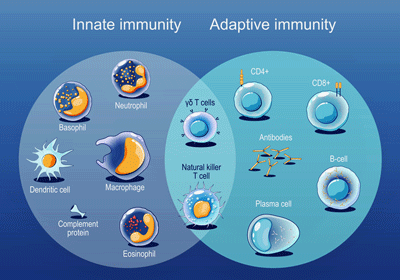
Nath believes that wonky B-cells leave the innate immune system – which is not designed to destroy pathogens – to carry the load.
We found that several metabolites in the cerebrospinal fluid of individuals with PI-ME/CFS were dysregulated. Of all the tests that we performed, these had the best potential for serving as a biomarker of the disease.
Note – Interestingly, given Nath’s focus on B-cell exhaustion, one of the main findings in the cerebral spinal fluid part of the intramural study was exhausted killer T-cells. Exhausted T-cells are the subject of a major NIH grant to Liisa Selin in the U.S.
We also found differences in an area of the brain called the temporal-parietal junction, which plays a role in integrating information, evaluating, and initiating physical action. This area, which drives the motor cortex, showed decreased activation in the ME/CFS participants. Abnormalities in this brain network and imbalances in catecholamines, chemicals that help regulate the nervous system, might help explain some disease symptoms.
We did not find any structural abnormalities but multiple functional or network abnormalities, which gives hope that the disease is treatable and possibly reversible.
The study acknowledges that post-exertional malaise is central to the disease. However, some researchers and many people in the ME community felt unhappy with the term ‘altered effort preference’ as an explanation for the origin of fatigue.
Your study suggests that healthy people chose harder physical tasks than those with ME. For those of us with ME, it is not simply a matter of choice. I often don’t leave the house not because I don’t want to go outside but because I am physically unable to leave the house most of the time. Can you explain why you chose the term ‘altered effort preference’? Do you accept that people with ME are physically unable to do the same physical tasks as healthy people?
Avindra Nath: Yes, we agree, that could very well be the case. Effort-Expenditure for Rewards Task (EEfRT) is a well-established neurophysiological test. As shown in our manuscript, effort preference is a neurobiological consequence of an immune response to the infection.
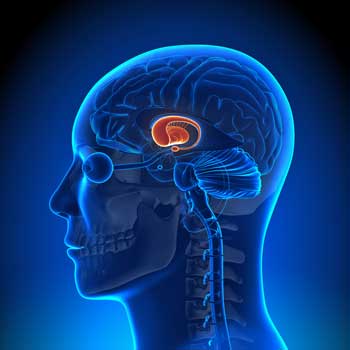
Changes in the basal ganglia have been associated with fatigue in ME/CFS, FM and other disorders
Note – the Effort-Expenditure for Rewards Task (EEfRT) has been most commonly used in research on major depressive disorder (MDD), particularly to study anhedonia (the inability to feel pleasure) – which ME/CFS patients do not have. The test has also been used to explore effort expenditure in a disease – Parkinson’s disease – which may have substantial connections to ME/CFS.
The basal ganglia are disrupted in both diseases and appear to be particularly vulnerable to inflammation. Basal ganglia damage is also associated with ‘psychomotor’ slowing and fatigue, both of which are found in ME/CFS.
Several studies have found problems with basal ganglia functioning in ME/CFS and fibromyalgia. Andrew Miller’s ability to link basal ganglia dysfunction in ME/CFS with the “unrewarding rewards” he found might fit with effort preference findings in Nath’s study.
For many of us with ME, the pace of research into our illness appears agonizingly slow. There has been a dire lack of research into potential treatments which may mitigate some of the symptoms of ME. Does your research point to any potential treatments for ME?
Avindra Nath: Yes, our study suggests that immune modulatory therapies should be considered as disease-modifying treatments. These would need to the tailored to the patients to target the predominant immune abnormality in that individual. These medications can have serious side effects; hence they need to be studied in the context of a clinical trial.
It is necessary to conduct clinical trials and study pathophysiology in the context of these clinical trials. One such method might be to consider a platform trial where multiple agents can be studied and compared against one another with a single placebo arm.
Note – Nath has proposed that “checkpoint inhibitors” be used to reset the immune system in ME/CFS. If something is holding B and T-cells back from performing correctly in ME/CFS, checkpoint inhibitors could take the brake off of them, allowing them to thrive and remove the pathogens or pieces of pathogens that Nath believes keep tweaking the immune system.
Nath is remaining engaged in the post-infectious disease space. He’s begun an IVIG long COVID trial and an intensive long-COVID study with a larger cohort. Nath said, “That’s how I can benefit the ME/CFS patients a lot faster than I could otherwise”.
Nath’s idea of using platform trials has been embraced by the RECOVER Initiative in long COVID.
Vicky Whittemore Interview

Vicky Whittemore leads the ME/CFS effort at NINDS.
Many scientists in the field of ME research welcome the intramural study as presenting a number of ‘compelling findings’ that will be of great benefit to future research into the illness. Having said this, the low number of study participants is one limiting factor of this study.
It is quite clear that further research is needed to find the causes of ME, to find biomarkers for the illness, and to discover potential treatments as well. Can you tell our readers about the NIH Initiative, the NIH ME/CFS Research Roadmap, for further research to improve our understanding of this debilitating neuro-immune disease? Does this roadmap include the involvement of the ME community?
Vicky Whittemore: The ME/CFS Research Roadmap is an ambitious report developed by a Working Group of NINDS Council that included researchers, clinicians, leaders of advocacy organizations, as well as five people with lived experience. These individuals were absolutely essential to creating the Roadmap so that future research and clinical trials are not only scientifically valid and impactful but carried out with the needs of people with ME/CFS in mind.
The goal of the Roadmap was to assess current ME/CFS research activities and identify opportunities and gaps in ME/CFS research to identify targets for the development of treatments.
Twenty-one people with ME/CFS, caregivers, spouses, and others with lived experience planned and ran eight topic area webinars with open Q&A sessions. Speakers included people with lived experience and leading experts in ME/CFS from around the world. We focused on answering three key questions: what do we know, what don’t we know, and what do we need to do to accelerate research to move toward clinical trials?
The broader ME/CFS community played a major role in the Roadmap. We hosted public webinars and crowdsourcing campaigns, resulting in over 400 suggestions for research directions from the community.
The Roadmap report was presented to and accepted by the NINDS Council in May 2024.
Our next steps may include plans to form a clinical trial working group, a genetics working group, and new NIH funding mechanisms to support exploratory research.
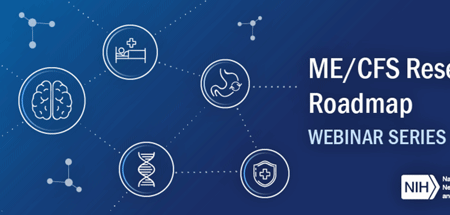
The Roadmap was designed to spark interest and create more funding for ME/CFS. So far that hasn’t happened.
The full ME/CFS Research Roadmap report and topic area webinars (also called the ME/CFS Research Roadmap Webinar Series) are posted on the NINDS website. Note – the Roadmap was accepted in July and no new funding has been announced. Please sign MEAction’s petition to Director Bertagnolli to provide funding to support the Roadmap.
Sign the Petition Here
The ME/CFS Roadmap Report of May 2024, noted the urgency of promoting research into ME and asserted that the number of ME/CFS trials needs to be ‘dramatically increased’.
I found no mention of the issue of suicidality, however, amongst people with ME. In 2018, the Lancet ran a piece that noted that people with ME had a six times higher suicide rate than the rest of the general population.
In an interview with Professor Leonard Jason in 2023 on this subject, he stated that the high rates of suicide amongst pwME is an ‘unacknowledged public health crisis’. Will the ME/CFS Roadmap Research Report incorporate the issue of suicide amongst people with ME?
Vicky Whittemore: The ME/CFS Research Roadmap report is finalized and has been accepted by the NINDS Advisory Council. The Trans-NIH ME/CFS Working Group is moving forward with follow-up from the initiative to address the research priorities identified in the report. We acknowledge that there are important areas, like suicidality, that were not addressed in the report and may be addressed through additional working groups going forward.
National Institutes of Health (NIH): If you or someone you know is struggling or having thoughts of suicide, call or text 988 or chat online to connect with the 988 Suicide & Crisis Lifeline. The Lifeline provides free and confidential support to people in suicidal crisis or emotional distress 24 hours a day, 7 days a week, across the United States. In life-threatening situations, call 911.
At the NANDSC Roadmap meeting, you said something about a new funding opportunity for ME/CFS. Can you explain what that is?
We are currently working on developing a new funding opportunity for ME/CFS.

This appears to be the first grant package the NIH has specifically designed for post-infectious diseases. the amount of funding is unknown.
Note – this was explained by one person as a kind of make-up for not funding the third ME/CFS research center. Time will tell, but whatever it is, it’s apparently expected by the end of the year.
Two new funding opportunities for infection-associated chronic illnesses, including ME/CFS, are expected to be published in late October (see NOT-NS-24-105 and NOT-NS-24-1 08).
Note – This appears to be the first funding mechanism the NIH has produced for post-infectious diseases. Note that the RECOVER Initiative for long COVID was mandated by Congress. On its own, NIH has provided surprisingly few grant opportunities for long COVID or for post-infectious illnesses.
One funding opportunity (NOT-NS-24-105 ) provides large (ROI) grants and the other (NOT-NS-24-1 08) smaller (R21) exploratory grants. The funding opportunities have not been published and we do not know how much funding they will provide or how many grant awards are expected.
Interestingly, the NIH’s immune institute (NIAID) is not partnering with NINDS on these awards. That’s a bit surprising given that the new NIAID director, Dr. Jeanne Marrazzo, has shown interest in post-infectious diseases and ME/CFS. We will see if NIAID supports the new ME/CFS funding opportunity.
These appear to be excellent grant packages that will explore “ongoing exacerbated inflammatory response, microvascular and/or thromboembolic dysfunction, pathogen-induced autoimmunity, bioenergetic failure with metabolic and mitochondrial derangements, gut dysbiosis, and the reactivation of latent pathogens.” It was particularly good to see bioenergetic and metabolic derangements in there. The only question at this point is how much funding they will provide.
Is it true that the NIH is dropping one ME/CFS research center and only funding two now?
The initial RFA resulted in funding one Research Center at Cornell University (U54AI178855). The RFA was reissued and an additional Center at Columbia University (U54NS137199) was funded. Funding decisions are based on a rigorous peer review process that prioritizes support for grant applications most likely to make highly impactful contributions to ME/CFS research. We cannot share any details from the reviews because they are strictly confidential.
Note – It was disappointing that the NIH: a) failed to fund a third center; and b) did not increase funding for the two centers to account for inflation. The NIH’s failure to do that leaves its funding ME/CFS research centers funding program at about 50% of its original 2017 level. Nor has the NIH funded followup studies to the Nath study – which was putatively designed to provide clear avenues for ME/CFS research – or the Roadmap Initiative.
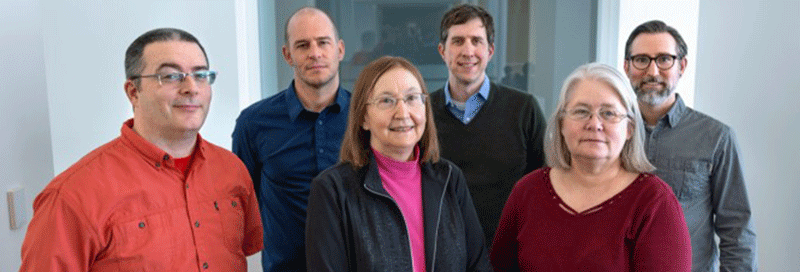
Maureen Hanson’s Cornell Group will continue its exciting muscle, and immune studies
Maureen Hanson’s ME/CFS research center – will continue to use the multi-omic single-cell profiling it used to produce such excellent results. (Instead of cells being assessed en masse, they are assessed one by one.) The lab will do a very fine-tuned assessment of the gene expression in ME/CFS muscles, identify which cells exercise is damaging, and expand its exciting work on monocytes and platelets, and the role they play in inflammation and coagulation.

Ian Lipkin’s Columbia group will dig deep into antibodies, search for past infections, and create a US based GWAS study (to complement DeCode ME)
Ian Lipkin’s ME/CFS research center – will create a smartphone app that will determine over the course of a year if antibodies can help explain ME/CFS patients’ symptoms. It will also work with Solve M.E. to identify 5,000 people with ME/CFS whom it will employ in Genome Wide Association Studies (GWAS) in the U.S. to determine if common gene mutations can help explain ME/CFS. It will compare its results with the DeCodeME results in the UK. Finally, it will use cutting-edge technology (peptide-based phage display) to uncover past infections in samples of chronic fatigue patients and healthy controls taken before the coronavirus epidemic.






Day 3 high dose thiamine. Early days but seems like there’s a lift in my mental energy. Seem to retain energy levels better through the afternoons. Will report back a few days later.
Excellent!
What is the dose of thiamine?
I am doing 600mg. I am still not sure if it’s really helping or not
Thanks cort.
This is beyond frustrating but glad these people are trying to help us
Regarding T cell exhaustion. Was there not a study some years ago showing t cell activation early in the illness, followed by t cell exhaustion? Nath’s study probably wouldn’t have picked up on those subtleties, assuming most or all of the study participants had had ME/CFS for at least a few years. But not necessarily inconsistent.
So, all well and good. Let’s address the cause of these things! Treatments Please!
Will be interesting to see how PolyBio’s studies will go. When is Nath’s IVIG trial due to be completed? And I think BC007 rrsults due soon?
I don’t know when the T-cell exhaustion findings began but I count three studies from the last year that found it in ME/CFS and one hypothesis paper proposing that T-cell exhaustion is driving ME/CFS…
It’s my CFS memory! You will know the study. Was it Hanson et al? It was maybe 6/7 years ago. T cell activation early in the illness, followed by t cell exhaustion. The idea isn’t new or novel. Research moving like a snail, although admittedly a bit more quickly and promisingly recently
” T cell exhaustion”’
Is this a medical scientific term? Sounds like pseudoscientific to me, what causes this? This is not the cause but an effect….
Exactly!!
These fools are going to turn this into a money making machine…and again, not get to the root cause
People… go listen to Sarah myhill. Her videos explain all this in great detail
So we have a chronic low grade muddling infection (or infections). With possible autoimmunity. Without any physical damage found. The cause may lie in improperly functioning B cells. That would be the common denominator in ”all” post-infectious ME patients, sounds plausible. This leads to a multisystem disease where there are differences between individual patients. Depending on which infection(s) play a role per patient.
Thank you, Cort, for all your work with these interviews and the information on funding and advocacy efforts.
I wanted to suggest an idea for an article (or part of one). New technology that can measure blood volume quickly and inexpensively:
https://detalo-health.com/
The research version is available to use worldwide; the medical version is approved for use in Europe.
Oops, I mean thank you to Bronc!
🙂
You are welcome!
No mention of spike protien.
I assumed all these post infection diseases were all about “spike protien”and removing it from the body
The spike protein only applies to the coronavirus – it’s the part of that virus that enters the cell.
Even though they are triggered by different pathogens post-infectious diseases share so many characteristics that it doesn’t appear the cause going to come down to what one pathogens is doing. It seems that these different pathogens are triggering similar core responses.
Exactly how they’re doing that is unclear and the spike protein may very well play a role in long COVID. In the other diseases reactivated herpesviruses are the best guess.
One idea is that mitochondrial breakdown in the B-cells and likely other cells is crimping the immune system.
Time will tell!
”The spike protein only applies to the coronavirus…”
This is not entirely true because the mRNA vaccinations ensure that your own cells in your body produce corona spike proteins against which your immune system will produce antibodies. That has consequences.
Exactly!!
These fools are going to turn this into a money making machine…and again, not get to the root cause
People… go listen to Sarah myhill. Her videos explain all this in great detail
Sarah Myhill failed me completely when I consulted her. Charged £400 to read through a questionnaire I had completed that I thought was going to used for background to a full consultation. It was described as “looking at my case”.
I felt very let down indeed. I waited months for her opinion. Living less than 30 minutes drive away she seemed the obvious “expert” to help me after decades of suffering.
Nothing she suggested helped my fibromyalgia, ME, hypothyroidism, multiple chemical sensitivities etc, etc. Don’t put too much faith in her methods.
Her insistence on a keto or low carb diet didn’t help either & since following it for 6 months I have to now cope with rebound full diabetes. I’m not a fan.
I have to take issue with your comment. Dr Myhill helped me enormously when my ME was really bad.
She is a brave courageous doctor who was witch hunted by the UK medical establishment for daring to question their dogma which was harming people through its recommendation of CBT/GET.
I reported on my personal recent experiance, not an opinion. I expected the help you received & didn’t get it. I felt hugely let down & at that price, ripped off.
I just want people to know that not all her methods work for everybody, obviously, as they made me worse.
There is no reason at all why I shouldn’t tell it as it was for me.
Glad she helped you. Don’t criticise me for reporting my personal, disappointing experience. Totally different from an unfounded “witch hunt”. She let me down.
You misrepresent my comment. I said that Dr Myhill was witch hunted by the UK medical establishment.
I am defending Dr Myhill has she has helped thousands of people with ME. More so than any other doctor in the UK.
You said that you took issue with my comment. That’s personal.
You could have given your opinion of Dr Myhill without referencing my comment. There is no other way of interpreting your comment. You obviously think you know better. You were just luckier.
Not at all you are acting rather childishly now.
I took issue with your attack/opinion on/of Dr Myhill whose good character is beyond question.
She always acts out of the best of motives.
I am sorry to hear that you didn’t benefit from her help.
We shall not agree on this issue.
My experience with Dr Myhill goes back to 2007 when she was fairly helpful but several times her suggestions made me worse especially the more recent one when she insisted a keto diet would help me. It did not and made me worse and raised my blood sugars. Also the advice she once gave me on my hypothyroidism made me worse and I found it to be inaccurate too as I gained wider knowledge of the condition which now is managed well.
I found that more recently she has become a money making machine at least that is how it seemed to me. I am not impressed by her at all and note that when I look anything up on her website which used to be very helpful, it will make reference to one of her many books with an obvious encoragement to buy it.
Finally my impression is that these days she offers a one size fits all approach which isn’t going to work for such a complex illness.
Good work as always Cort, before i found healthrising it was hard to get a good idea of mecfs news and how things stood despite looking all over for an idea of mecfs research progress
In addition to suicide deaths I wonder how many ME kills through poverty, there is talk of people being unable to afford food, going homeless, and probably dying on the streets. Wouldn’t be surprised if there are really massive numbers of deaths but because ME isn’t well known the causes of death are attributed to other things. How many, perhaps, die of infections that would have done little to a healthy person, I have ME/CFS and every time i catch an illness it is more severe for me that for the person i caught it from, since i don’t go out much it is easy to tell where i got the illness due to the limited number of people who could have given it to me and the similarity of symptoms
Just a heads up, in the above article the link that says “Sign the Petition Here” isn’t working
Also there is a repeat of a few lines tho worded slightly differently, this is copy n pasted from the above article:
“The gist is that when the B-cells get knocked down (and possibly the T-cells, since they appear to be exhausted as well), the responsibility for fighting off the infection lands on the inflammation-producing innate immune system. In this scenario, the infection never gets resolved and the pathogen keeps tweaking the immune system – causing the symptoms of ME/CFS.
The gist is that with the B-cells knocked down (and possibly the T-cells since they appear to be exhausted as well), the innate immune goes bonkers producing inflammation all the while inadequately controlling the pathogen. A 2021 study suggested the B-cells in ME/CFS are indeed reacting to a pathogen.”
Way back when we were suspecting lyme, there was a lyme literate md here in Canada that told me they were going out into the streets of towns and city’s looking for homeless people. They were treating them for lyme disease, many of them going back to normal livelihood
There is one large entity that should be held accountable for ruining the lives of many of us. It’s not just me/cfs.
Since I spent decades researching the net,I text with people all over the country that couldn’t get a diognosis for many diseases.
I’ve learned through my searching that many illnesses can be reversed if caught in the early stages….could it be that is the case with me/cfs….that once it gets a foothold its irreversible without intervention
It takes 11 years to get a diognosis for celiac…
REALLY!! When all one has to do is change their diet and remove wheat.
More proof that the medical systems are self serving.
Those poor people in the UK
A national inquiry please so that this doesn’t happen again.
Too late for many of us but what about all the up and comers that will be passed around for years before they get diognosed.
Signed: a life wasted
You make a very valid point which is really ignored by most ME advocacy outlets/charities. When I interviewed Professor Leonard Jason he stated that the high levels of suicide amongst people with ME were “an unacknowledged public health crisis.” Yet no one in the ME community wants to address this issue.
When I interviewed Dr Lily Chu, who co wrote a paper with Professor Jason on risk factors for suicide amongst people with ME ,she noted that poverty is a risk factor for suicide amongst people with ME. Here in the UK large numbers of people with ME get their claims for a disability benefit called PIP turned down causing huge hardship and stress.
I was one of those suicidal peeps….only because I couldn’t handle the severity of the widespread body pain…green skin and arms, very near death I believe
The fact that I keep trying to tell my story of severe illness is testimony of my now
PTSD from the the entire affair.
I had no idea a person could become that near death and go for such a hell ride.it continues to blow my mind how I got gaslight for near 40 years
“downregulation of a part of the brain called the temporal-parietal junction, which is involved in initiating physical action”: I suggest that this could be a protective mechanism of the body that produces fatigue to protect against running into PEM.^
As for me, stimulants like caffeine as well as adrenaline provide a temporary non-sustainable increase of functionality that often leads to a crash afterwards (as if it just “burns the candle faster”, it might be interesting to see if caffeine (directly or indirectly i.e. via its effects on adrenaline) or adrenaline happen to be able to remove a downregulation of the temporo-parietal junction?
I think these two studies are much more exciting.
1. Antibodies to HHV6 and HHV-6 dutpase are strong indicators of Long Covid.
https://hhv-6foundation.org/all/antibodies-to-hhv-6-and-hhv-6-dutpase-are-strong-predictors-of-long-covid
2. Merck has identified a potent broad spectrum herpesvirus antiviral. Granted this is in animal studies, but it could become a huge advance in treatment for HHV-6 A & B and EBV in further testing.
https://hhv-6foundation.org/antiviral-treatments/after-screening-100000-compounds-merck-identified-a-potent-broad-spectrum-herpesvirus-antiviral
Ewww…those are interesting and I had missed them both – thanks for the links!
“The Merck team identified a molecule it calls compound 42”. Would be great if it was indeed the answer to everything. I don’t understand this in detail but it seems to me that this compound will still work by inhibiting replication like previous herpes antivirals did, so possibly it cannot target the pre-replication stages of chronic reactivation any better than acyclovir? (The publication abstract https://pubmed.ncbi.nlm.nih.gov/39140041/ says: “Herpesviruses share a conserved DNA polymerase, the inhibition of which is validated as an effective strategy to disrupt viral replication. By utilizing a non-nucleoside inhibitor of the viral DNA polymerase, we sought to develop agents covering multiple herpesviruses” – i.e. it still seems to have the same target of DNA polymerase as previous drugs?)
That’s the main question to me: what drugs can target the pre-replication stages of reactivation that as far as I understand could play a role in ME/CFS.
However, if this new compound has less side effects as promised, it could still be a drug that could be used more widely to inhibit the smaller amount of actual replication that will also be ongoing with chronic reactivation, and may have a degree of benefit for ME/CFS?
Thanks JR – sounds very hopeful – better drugs for herpesviruses has got to be high on the list for several diseases.
For Prusty’s findings on herpes virus dutpases (via antibodies against dutpases) look at recent presentation here https://www.youtube.com/watch?v=YUnBWvw3wGA , starting from around min 15:37 – 23:36, or German transcript here https://www.fatigatio.de/fileadmin/Projects/07_fatigatio/user_upload/Fachtagung_2024/Fachtagung_2024_Uebersetzung_Prusty_NEU.pdf (copy text to translator).
I love the fact that he got the dutpases in there! Tying in his findings with years of those findings. Those kinds of things warm my heart 🙂 🙂
And here’s more on dutpases as well as Activin A (posted by Renz-Polster), 2022 study: https://insight.jci.org/articles/view/158193/pdf
Interesting.
Note the conclusion for the first study that the authors don’t know if the antibodies lead to symptoms or are mere epiphenomenon of immune dysfunction
I’m sorry but I do not trust any study by Merck which played an atrocious role, like many other big pharma companies, during the pandemic.
In pursuit of boosting the prosects of its own novel covid drugs Merck put out disinformation regarding Ivermectin.
Hopefully with RFK jr taking over as director of HHS next year then the pernicious role of big pharma will be dealt with by a man of integrity whose sole concern is to make the health of the public much better.
Hi Bronc, There is no one who knows more about the pharmaceutical industry than my family. We were in court for 10 years over Bendectin, a morning sickness medication that caused thousands of children (including our son) to be born with partially missing limbs. We won the first 2 1/2 month trial but the judge tossed out our verdict on a JNOV (Judgement Nonwithstanding Verdict). That means that no matter what the jury thought, the judge rules. The judge was brought in specially to try our case since Bendectin was big business all over the world. We were ordered back to a second trial 2 1/2 month trial within a year but our attorneys had run out of money so we had a “paper trial” which means that trial testimony is not presented by live witnesses. It is just read to a bored jury. We lost. Then Dow Chemical who had bought the drug during the second trial asked the judge to tax my family with $200,000 in court costs. We would have been facing bankruptcy, but the judge reduced what we owed them to $5900. The attorneys said not to worry about it. They were just trying to intimidate me because I was helping other families. But we should have worried. Two years later when we tried to refinance our home, the bank said we couldn’t because there was an $11,000 lien on house placed there by Dow Chemical Company. It was growing at 10% compounded annually. If we hadn’t found out about it, who knows how big it would have grown. Eventually we settled with Dow by paying them $3000 to take the lien off our home. But we got Bendectin off the world-wide market.
We litigated the Bendectin issue at the encouragement of whistleblowers from the FDA who risked their jobs and pensions to warn us about this dangerous drug.
My only point about Merck is there is no smoke without fire. They wouldn’t be looking at anti-herpes drug if they didn’t think that was the cause.
Hi Bronc, I tried to respond but my comment is awaiting moderation.
Hi Bronc, If you would like to contact me at betty@birthdefects.org , I will send you my comment.
Betty
I’ve been noticing autoimmunity being brought up more and more. Coincidentally, I was diagnosed with autoimmunity last August and my son tested positive one week ago. Now I wonder if we’ve had both had CFS that turned into autoimmunity or if we’ve been autoimmune all along. I’m also curious if most CFS patients have been tested for autoimmune diseases.
Did Dr Unutmaz’s lab lose funding? If so, why since his expertise is in immunology?
“Interestingly, the NIH’s immune institute (NIAID) is not partnering with NINDS on these awards. That’s a bit surprising given that the new NIAID director, Dr. Jeanne Marrazzo, has shown interest in post-infectious diseases and ME/CFS. We will see if NIAID supports the new ME/CFS funding opportunity.” That is interesting. Grants sound like piecemeal projects – we need a head of MECFS and research center within NIH. The economic burden of this disease is tremendous- causing otherwise healthy people to become unable to work during their prime earning years and huge insurance expenses as we go from Dr after Dr for years looking for diagnosis and treatments. I can’t imagine how MECFS doesn’t immediately get funded. Anyone have Dr Marrazzo’s ear?
Since my last post was held for moderation. I will try again with some other important studies.
Abstract
Human herpesvirus 6 (HHV-6) is an important immunosuppressive and immunomodulatory virus worldwide. However, whether and how HHV-6 infection influences the metabolic machinery of the host cell to provide the energy and biosynthetic resources for virus propagation remains unknown. In this study, we identified that HHV-6A infection promotes glucose metabolism in infected T cells, resulting in elevated glycolytic activity with an increase of glucose uptake, glucose consumption and lactate secretion. Furthermore, we explored the mechanisms involved in HHV-6A-mediated glycolytic activation in the infected T cells. We found increased expressions of the key glucose transporters and glycolytic enzymes in HHV-6A-infected T cells. In addition, HHV-6A infection dramatically activated AKT-mTORC1 signaling in the infected T cells and pharmacological inhibition of mTORC1 blocked HHV-6A-mediated glycolytic activation. We also found that direct inhibition of glycolysis by 2-Deoxy-D-glucose (2-DG) or inhibition of mTORC1 activity in HHV-6A-infected T cells effectively reduced HHV-6 DNA replication, protein synthesis and virion production. These results not only reveal the mechanism of how HHV-6 infection affects host cell metabolism, but also suggest that targeting the metabolic pathway could be a new avenue for HHV-6 therapy.
This may be why metformin is a possibly useful treatment.
“Metformin reduces HHV-6A replication in T cells by activating AMPK”.
This may also explain the reason for this huge study “After screening 100,000 compounds, Merck identified a potent broad-spectrum herpesvirus antiviral” A big pharma company does spend this kind of research funding for the ordinary herpes viruses that can be treated with acyclovir.
And finally since I hope this will post: “Antibodies to HHV-6 and HHV-6 dUTPase are strong predictors of Long COVID”
Thank you for your contribution Betty Mekdeci. Just this week I started Metformin treatment. It is interesting to know the mechanism of how it works.
Hi Iris 2025, We will all be interested in learning if the Metformin treatment helps you.
All the research I monitor suggests that HHV-6 A is the major cause of ME/CFS and Long Covid. Since studies of treatments for HHV-6 A are underway, this underscores this assertion. And there are certainly tests for HHV-6 A or these studies couldn’t be done.
Abstract
Human herpesvirus 6 (HHV-6) is an important immunosuppressive and immunomodulatory virus worldwide. However, whether and how HHV-6 infection influences the metabolic machinery of the host cell to provide the energy and biosynthetic resources for virus propagation remains unknown. In this study, we identified that HHV-6A infection promotes glucose metabolism in infected T cells, resulting in elevated glycolytic activity with an increase of glucose uptake, glucose consumption and lactate secretion. Furthermore, we explored the mechanisms involved in HHV-6A-mediated glycolytic activation in the infected T cells. We found increased expressions of the key glucose transporters and glycolytic enzymes in HHV-6A-infected T cells. In addition, HHV-6A infection dramatically activated AKT-mTORC1 signaling in the infected T cells and pharmacological inhibition of mTORC1 blocked HHV-6A-mediated glycolytic activation. We also found that direct inhibition of glycolysis by 2-Deoxy-D-glucose (2-DG) or inhibition of mTORC1 activity in HHV-6A-infected T cells effectively reduced HHV-6 DNA replication, protein synthesis and virion production. These results not only reveal the mechanism of how HHV-6 infection affects host cell metabolism, but also suggest that targeting the metabolic pathway could be a new avenue for HHV-6 therapy.
This may be why metformin is a possibly useful treatment.
“Metformin reduces HHV-6A replication in T cells by activating AMPK”.
This may also explain the reason for this huge study “After screening 100,000 compounds, Merck identified a potent broad-spectrum herpesvirus antiviral” A big pharma company does spend this kind of research funding for the ordinary herpes viruses that can be treated with acyclovir.
And finally since I hope this will post: “Antibodies to HHV-6 and HHV-6 dUTPase are strong predictors of Long COVID”
Cort, why are my three recent comments under moderation? They are based on published studies.
I don’t know why some comment get put into moderation. I actually have nothing to do with putting comments in the moderation queue – that is done automatically – all I can do is move them out of it -which I have done :). Really glad to see research on HHV-6. Thanks!
I was diagnosed years ago with CFIDS by Klimas. Since then I was diagnosed with MCL, cancer (B cells). Now I was diagnosed with (COVID 19 Long manifesting Chronic Fatigue) Interesting they only used Chronic Fatigue. This was during a hospital stay. I believe it is too late to get a true example of ME/CFS as in many cases it has been commingled with Long Covid.
BC007 fails. Probably really is time to put antibody theories to bed:
https://www.berlincures.com/en/news/phase-2-long-covid-results
Oh wow. But, as many medications do, could it still benefit a subgroup? I hope they will still publish their results (& patient selection criteria).
Wouldn’t get hopes up. The company is in trouble too. Sadly another failure
That’s what we are all hoping. Seems like they won‘t. Online some patients say they experienced huge improvements but in total it failed to be effective compared to placebo
I don’t think that trial will do that to the antibody hypothesis – but wow, BC007 bites the dust – and it seemed so promising…It seems so strange – all this hope built up – and suddenly this small statement appears… Thanks for passing it along.
Good to know that you do not think the ab hypothesis has failed Cort
I am conflicted. That is also what Dr Wirth is suggesting with mitodicure. On the other hand what is if we have not identified the right antibodies yet? And BC007 was just inefficient in removing ab alltogether? If I am not mistaken they were also planming on using it for cancer treatments which now seems cancelled as well?